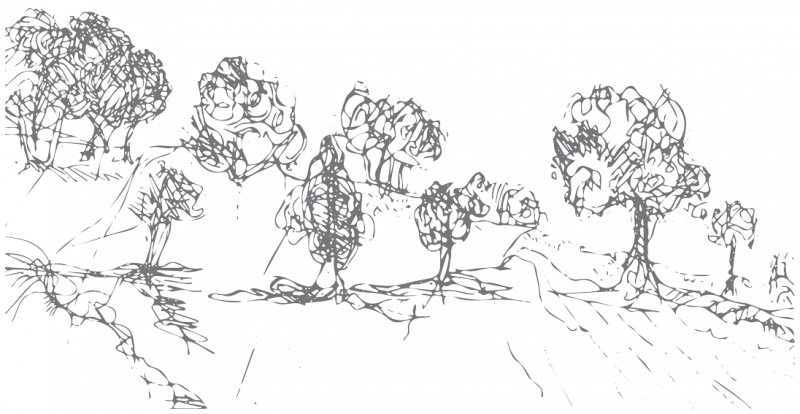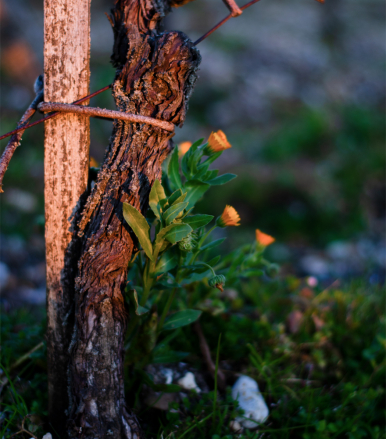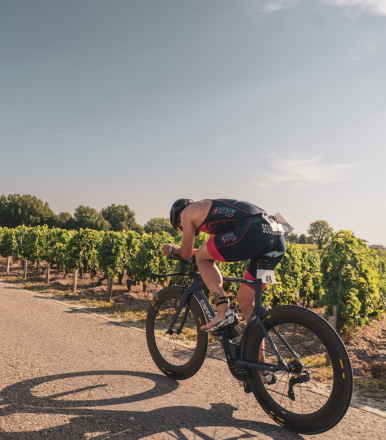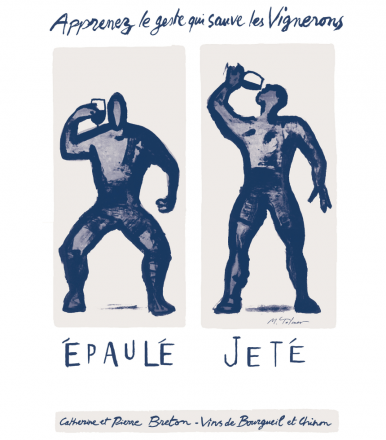
Read Aussières
About Domaine D'Aussières
Aussières was built on a fertile ecosystem where nature and people meet to learn from each other and create. Here, they say that it takes a village to make a wine.
Our village is a living place, where dialogue is the prevailing value. A multiple dialogue : Between the elements, between the generations that have worked its land, between its villagers and its craftsmen, and between the different currents of thought in the world of wine. Aussières brings everyone to the table, keeps the conversation going, ultimately leading to a sense of accomplishment.
The Vineyard
The vineyard of Aussières extends over 167 hectares on the foothills of Fontfroide, south of Narbonne. The soil is very shallow and stony on the high slopes, and sandier and deeper on the plains. In some lots, blocks of pink sandstone outcrop and hinder mechanical work.
Two thirds of the vineyards are Corbières Appellation, and the remainder is Vin de Pays d’Oc. Each with its own grape varieties: Syrah, Mourvèdre, Grenache, Carignan, and Cinsault in the former; Chardonnay, Merlot, Cabernet Sauvignon, Cabernet Franc, and Petit Verdot in the latter.
The vineyard of Aussières is managed in the tradition of the Corbières, with plantations of 4400 vines/hectare, with VSP training.
History
The first official records of Aussières date back to 97 AD. An important supplier of wine to Rome for many years, its vines were uprooted by decree of the Roman Emperor Domitius, who aimed to boost the success of his own Italian wines.
Aussières became the property of the Abbey of Fontfroide in 1065, once again functioning as a farm and vineyard. After the French Revolution, it was confiscated from the church and bought by Count Daru, manager of Napoleon Bonaparte’s private estate, who continued its lucrative wine production.
Until the 1950s, Aussières remained a wine-producing village with 180 inhabitants, a school, a bakery, a forge, and hundreds of hectares of vines in production.
In 1999, the abandoned estate was bought by Baron Eric de Rothschild, who decided to redefine it as a high-quality wine estate.
“Today, the wines of Aussières express the history of this ancestral property, as well as the most recent efforts of our teams that have allowed this extraordinary terroir to reach its full potential. We look forward to seeing how these expressions evolve over the years.”
Saskia De Rothschild
The Village
The remains of what was, until the 1950s, a bustling craft village were renovated by Baron Eric de Rothschild’s team. The challenge was to elevate the village to a place that could be functional and prosperous in the 21st century, while preserving its history and traditions.
Today, the village of Aussières is home to many employees and seasonal workers, as well as the winery, administration, and machinery sheds.
In the years to come, we would like to welcome back the craftsmen and bring the village back to life with a new wine tourism programme, cultural events, artists’ residencies, etc.
A Single Ecosystem
The wild hills and complex geological formations of the Cathar country, bathed in sunshine and fresh Mediterranean air, create a rich ecosystem of flora and fauna meticulously maintained by the Aussières team.
Only one third of the 570 hectares of the estate is used for crops. The rest of the land is left covered by forest and scrubland in order to build up biodiversity for years to come.
Slow-Paced Life
The Corbières region is a micro region of the Languedoc, known for its strong character. More than a pretty postcard, it is a land full of life, contrasts, and layers.
To discover it, hike through its rocky hills, along the carefully preserved ecosystem that borders the Mediterranean Sea. Jump from one Cathar castle to another, meet flocks of sheep. Wander through the lively covered market in Narbonne…
The Corbières fosters the art of slow cooking and slow-paced living. The region, with its distinct terroir, is home to a fresh and rustic cuisine, made up of flavours from the land, simple ingredients such as wild herbs, beans, oysters from Gruissan…
The perfect microclimate of the Corbières, sometimes compared to California, limits the use of treatments, and has long set the course for sustainability. The locals take pride in protecting the region’s naturally preserved environment, especially the winegrowers, many of whom follow strict guidelines (AB organic farming, HVE – high environmental value – and others) to make the Corbières an eco-responsible wine destination.
Our Commitment
It takes a village to make a wine
The wines of Aussières are the product of millennia-old soils, secular winemaking traditions, and a commitment to a sustainable path, borrowing from ancient knowledge to prepare for the future.
For us, a healthy and natural ecosystem goes hand in hand with the quality of the wines and preserves the longevity of the vineyard.
“What matters most to me is the agroecological project of the property.”
Jean-Charles Forges, Vineyard Manager
Aussières has gradually eliminated all non-organic treatments prohibited by the Organic Agriculture (AB) label.
In 2018, the official request to convert to organic farming was made, subjecting our vineyards and wineries to a specific set of rules. This philosophy will be applied even further in the future, incorporating more specific organic farming and winemaking techniques. To increase biodiversity, Aussières has mastered the art of including vineyards as part of a whole, associating them with other crops such as olive trees amid hectares of scrubland and wild forest.
Biodiversity is a formidable asset to ensure the durability of the terroirs, to keep our soils alive, and to protect the vines from global warming, notably by creating islands of coolness.
To protect our fauna and flora, the property has twice as many hectares of wilderness around the cultivated land: 160 hectares are Natura 2000 classified, making it a protected area that we are committed to preserve.
Our flora and fauna are observed and protected, whether through creating a 6-hectare bird sanctuary in the ancient trees bordering the village or welcoming 700 sheep each winter who mow the estate with unparalleled precision.
“Developing the quality of the wines of Aussières while taking into account current issues of social and environmental responsibility is truly fulfilling.”
Johanna Nouvel, Research & Development Assistant
For years, we have been ploughing the plots in the least interventionist way possible, allowing the foundations to remain alive, as evidenced by our very successful ‘pants test’. This test consists of burying a pair of organic cotton pants and observing their degradation. The more the soil is preserved, the more the foundations are alive and the more the pants decompose. Natural or planted grass cover has become a valuable tool to amend the lots according to their needs, which vary from one year to the next.
The same care and absence of intervention is applied in the vat room, always in compliance with the rules of organic certification. During fermentation, the aim is to be gentle in the extraction to subtly reveal what each variety has to say. Sometimes, we use carbonic maceration for an unequalled purity of fruit.
This Domaine joined the B Corp community in December 2023. To learn more, click here
Read more about Domaine d’Aussières in our CSR report
The Wines
“In a way, winemaking is like photography. It is the winemaker’s duty to capture beauty at the right moment. The terroir commands and the winemaker’s goal is to reveal the full potential of the berries.”
The wines of Aussières reflect the contrasting terroir of Languedoc. Generous, elegant, pure, and spontaneous, each wine expresses a unique facet of this exceptional terroir.
The grapes used for Château d’Aussières come from selected plots located on the upper part of the hillsides. In this part of the vineyard, the soils are very shallow, composed of sandy sandstone with low clay content and dry conditions. As a result, yields from these plots are very low.
This wine is a blend of Syrah and Mourvèdre. The Mourvèdre vines, which have now reached maturity, produce grapes of exceptional quality. Green harvesting combined with meticulous grape sorting aims to achieve a powerful wine with great precision.
Château d’Aussières Rosé captures the complexity and finesse of its terroir. Thanks to Aussières’ cooler location, the Grenaches ripen slowly, developing a wide aromatic palette. They allow for a silky and elegant palate. The Syrah adds freshness to the blend and contributes to the perfect balance between generosity and tension. The winemaking process involves minimal intervention to express the intrinsic quality of the grapes.
“The energy of the Aussières terroir creates an aesthetically beautiful, qualitative, but above all humanly enriching working environment.”
Jean de Roquefeuil, Operations Manager
Altan d’Aussières is named after a wind that rises from the depths of the sea. It is the wild child of Aussières, bringing a breath of freshness.
For this unique blend, the grapes were harvested from the coolest areas of the estate, where they ripen slowly and gradually develop their aromas. 40% of the wine is made through carbonic maceration, giving it a unique profile of purity and lightness. The wine is aged for 6 to 8 months in vats, with an additional 6 months in bottles to allow the subtle aromas to settle. No barrels are used for this cuvée, which seeks to highlight the full expression and freshness of the fruit. The blend is composed of Grenache, Syrah, and Carignan, each making up about one-third of the wine.
Le Blason d’Aussières is made from vines planted on deeper soils, less affected by water stress. The resulting wine expresses itself with finesse, in the style of the wines from the Pays d’Oc. The Carignan undergoes partial carbonic maceration, contributing to its distinctive style. A small portion of the wine is aged in barrels, enhancing its complexity and balance.
The grapes selected for the A d’Aussières red – IGP Pays d’Oc – come from flatter, lower lots. The deeper soils and underlying sand provide optimal growing conditions for Cabernet Sauvignon, Merlot, and Cabernet Franc, which contribute to the complexity of this blend. The grapes are picked at optimum maturity, destemmed, and then vinified using traditional maceration methods. The wine is aged in vats to preserve all the freshness and purity of the fruit. The complexity of this blend derives from a unique combination of local varieties such as Syrah and Marselan, with varieties more commonly associated with the Bordeaux region such as Merlot, Cabernet Sauvignon, and Cabernet Franc.
A d’Aussières Chardonnay, PGI Pays d’Oc, is made from the freshest lots of Aussières and selected neighbouring terroirs, in order to obtain a wine with remarkable freshness. The grapes are harvested before daylight, when temperatures are at their lowest. After a few hours of cold maceration, they are pressed and fermented at low temperature in stainless steel tanks to preserve their aromatic potential. The wine is partially aged on lees to obtain a good balance between roundness and freshness.
The A d’Aussières rosé (IGP Pays d’Oc) comes from dedicated plots of land where the conditions are optimal for the production of a balanced rosé.
 Read next
Read next



